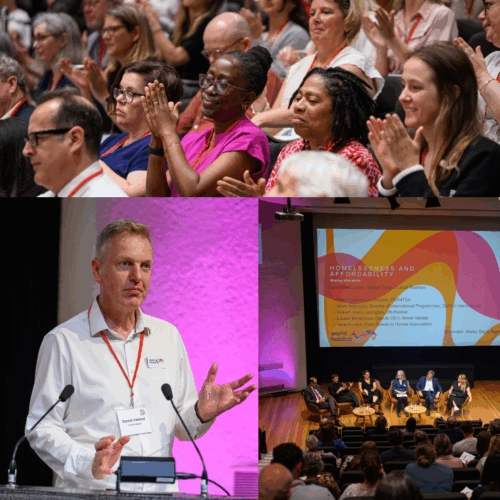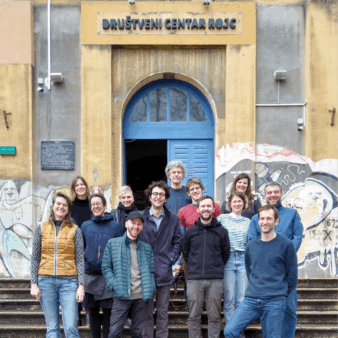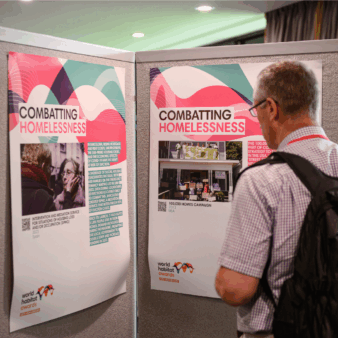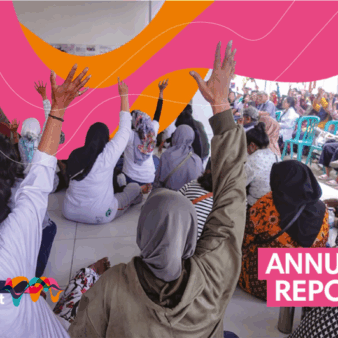
Is society broken? The housing crisis is leading many people to think it is. At World Habitat’s housing and affordability conference on 12th June, we were given reason to believe that something much better is possible.
Kwajo Tweneboa’s experience of shockingly poor treatment by the UK housing system spurred him to become a housing activist and campaigner. He explained how he and his family were made homeless when their landlord abruptly ended their tenancy and they were left with no affordable choices. He talked emotionally of his family having to wait all day in the council civic centre to prove they had nowhere else to go before they were given any help. At the end of the day, it was an ultimatum between moving an hour and a half away to the town of Luton, or living in a local hostel. With Kwajo and his siblings in nearby schools and his parents with medical needs being treated locally, they had no real choice but to accept months of living in substandard hostels and bed and breakfast hotels.
Matt Downie Chief Executive of Crisis told us the story of a homeless family that had their offer of a social home withdrawn because they were deemed too poor to live in social housing. It illustrates how the UK housing sector has lost sense of its purpose, he said. The UK (like many other countries) does not have a clear vision of what it wants from its housing system: A decent home for everyone? Or a market that operates to provide economic outputs? He pointed to countries like Finland and Denmark, where long-term policies to provide decent housing for everyone had worked. They proved that it is possible to end homelessness.
Leilani Farha, Global Director of the Shift, talked movingly about the seemingly impossible political moment we are in, where the notion of ‘home’ and its central importance to humanity seems to have been abandoned, letting unaffordability and homelessness run wild. Nowhere is this more extreme than the carnage of Gaza where homes have been deliberately targeted within a wider geopolitical game.
Delegates from around the world told us about growing populist political movements that no longer see solving social problems as their job. A simple definition of populism is ‘easy answers to difficult questions’. Solving the housing crisis certainly fits the profile of a difficult question that has attracted easy populist answers. We heard from Vera Kovacs from The From Streets to Homes Association in Hungary, a country that has been ruled by a populist government for over a decade. There, the government blames homeless people for their situation, for not planning their lives better, or for succumbing to alcohol or drugs. The world’s richest man has an even easier answer. “There is no such thing as homelessness” he says “it’s just people who have got a little behind on their mortgage.” As obviously untrue as these answers are, they provide readymade excuses for populist governments not to take the action needed to solve the housing crisis.
There is another even darker populist answer to the housing crisis. At the conference we heard how migrants are increasingly blamed for exacerbating housing availability, shifting narratives away from the problems with the housing system, towards accusations that migrants cause them. In fact, at the same time we gathered in London, over in Northern Ireland, racially motivated riots were raging, likely provoked by these kinds of sentiments.
Rick Henderson spoke about the futility of discouraging immigration, saying money would be better spent building more homes. “If my family were in danger nothing would stop me moving to a place where we could lead a safer better life” he said.
But through the darkness there were many lights of optimism. The conference took place the day after the comprehensive spending review in England which saw £39bn committed to a ten-year programme of renewing social housing. This was universally welcomed by speakers. Matt Downie described it as “Landmark moment that will change lives and prevent thousands of people from being pushed into the shadows.”
The conference heard from Susan Aktemel from Homes for Good a social enterprise in Scotland. She explained how she provides what she describes as beautiful affordable homes at rents that people on low incomes can afford. Her business model provides evidence that good and affordable don’t have to be mutually exclusive when it comes to rented housing. Homes for Good has been so effective that she is now working in partnership with Crisis to roll the model out in London.
Delegates also heard from inspiring people who had made things better in their communities. Geert De Pauw from Brussels Community Land Trust explained how he adapted the Community Land Trust model from what he saw on a World Habitat visit to Vermont a decade before. The model separates out land and property values so that homes become much more affordable for people on low incomes. He now leads an organisation that houses nearly a thousand people who would otherwise have been priced out of Brussels or made homeless.
Tanzanian Women Architects for Humanity empower low income women in rural areas by teaching them how to build houses for the elderly out of cheap and locally available materials.
Croatia has no national homelessness strategy, but that didn’t stop Helena Babić from the small Istrian city of Pula. She explained how she adapted the Housing First model that has been so successful in ending homelessness in Finland, to her own city.
Is society broken, or as Angela M Howard, chair of the board of Tanzania Women Architects for Humanity phrased it, have the broken just got the microphone? We certainly have many deep problems, not least the current housing crisis. As she collected the gold trophy for Hastings Commons, ‘Commoner at Large’ Jess Steele offered up an alternative vision of the future, where we mend what is broken. Perhaps the future can be better than we fear, if we back the emerging ideas, effective solutions and powerful people that are poised and ready to take back the mic and, in the words of Jess Steele, “darn the fabric of society.”




Join the discussion